| Listing 1 - 10 of 25 | << page >> |
Sort by
|
Book
ISBN: 9780195338317 Year: 2010 Publisher: New York [etc.] Oxford University Press
Abstract | Keywords | Export | Availability | Bookmark
 Loading...
Loading...Choose an application
- Reference Manager
- EndNote
- RefWorks (Direct export to RefWorks)
"Congress is the most open branch of the federal government, and its members labor to provide constituent services and court the news media, but because they speak with many voices they have long operated at a disadvantage against the singular image of the president. This very short introduction to Congress offers a concise explanation of how the Congress operates and provides historical context for its evolution. As a national forum, congressional debates and compromises have sought not only to enact laws but to forge national consensus behind them. Congress writes all federal laws, appropriates all federal funds, and checks and balances the executive and judicial branches. Its constitutional powers, structures, and procedures have remained remarkably consistent for more than two centuries. Yet Congress has often been criticized for obstructing or not standing up to the presidency, and for neglecting or delaying pressing national needs. This short introduction highlights the rules, precedents, and practices of the Senate and House of Representatives. It offers glimpses into their committees and floor proceedings to reveal the complex processes in which they enact legislation. It considers how members are elected and reelected, and the role of campaigns, lobbying, staff, and the media in legislative business. It also examines the changing demography of Congress, with the election of more women and racial and ethnic minorities, and their impact on the legislative process, in an era when a woman serves as Speaker of the House and African Americans chair key committees"-- "Many scholars believe that the framers of the Constitution intended Congress to be the preeminent branch of government. Indeed, no other legislature in the world approaches its power. Yet most Americans have only a murky idea of how it works. In The U.S. Congress, Donald A. Ritchie, a congressional historian for more than thirty years, takes readers on a fascinating, behind-the-scenes tour of Capitol Hill--pointing out the key players, explaining their behavior, and translating parliamentary language into plain English. No mere civics lesson, this eye-opening book provides an insider's perspective on Congress, matched with a professional historian's analytical insight. After a swift survey of the creation of Congress by the constitutional convention, he begins to unscrew the nuts and pull out the bolts. What is it like to campaign for congress? To attract large donors? To enter either house with no seniority? He answers these questions and more, explaining committee assignments (and committee work), the role of staffers and lobbyists, floor proceedings, parliamentary rules, and coalition building. Ritchie explores the great effort put into constituent service--as representatives and senators respond to requests from groups and individuals--as well as media relations and news coverage. He also explores how the grand concepts we all know from civics class--checks and balances, advise and consent, congressional oversight--work in practice, in an age of strong presidents and a muscular Senate minority (no matter which party is in that position). In this sparkling addition to Oxford's Very Short Introduction series, Donald Ritchie moves beyond the cynicism and the platitudes to provide a gem of a portrait of how Congress really works"--
Etats-Unis. Congress --- United States. Congress --- Verenigde Staten. Congress --- 214 Parlement --- Verenigde Staten --- United States.
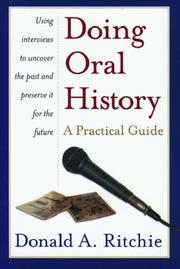
ISBN: 0195154347 0195154339 9780195154337 9780195154344 Year: 2003 Publisher: Oxford: Oxford university press,
Abstract | Keywords | Export | Availability | Bookmark
 Loading...
Loading...Choose an application
- Reference Manager
- EndNote
- RefWorks (Direct export to RefWorks)
Oral history is vital to our understanding of the cultures and experiences of the past. Unlike written history, oral history forever captures people's feelings, expressions, and nuances of language. But what exactly is oral history? How reliable is the information gathered by oral history? And what does it take to become an oral historian? Donald A. Ritchie, a leading expert in the field, answers these questions and in particular, explains the principles and guidelines created by the Oral History Association to ensure the professional standards of oral historians. Doing Oral History has become
#VCV monografie 2005 --- Historiography --- Oral history --- History --- Oral biography --- Oral tradition --- Historical criticism --- Authorship --- Methodology --- Criticism --- HISTOIRE ORALE --- TEMOIGNAGE HISTORIQUE --- METHODOLOGIE --- Information retrieval --- History of civilization --- oral history [discipline] --- oral histories [literary works]
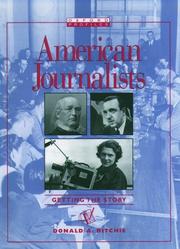
ISBN: 1280564040 1423774086 9781423774082 9781280564048 0195099079 9780195099072 9786610564040 6610564043 9780195328370 9780198025948 0198025947 Year: 1997 Publisher: New York Oxford University Press
Abstract | Keywords | Export | Availability | Bookmark
 Loading...
Loading...Choose an application
- Reference Manager
- EndNote
- RefWorks (Direct export to RefWorks)
Sixty essays on American news reporters, editors, publishers, and broadcasters, including Benjamin Franklin, Frederick Douglass, and Connie Chung, whose careers significantly advanced or symbolized major changes in journalism.
Journalists --- Journalism & Communications --- Journalism --- Biography --- Juvenile literature

ISBN: 9780198035138 0198035136 0195154347 0195154339 9780195154337 0195154339 9780195154344 0195154347 1280837799 9781280837791 Year: 2003 Publisher: Oxford Oxford University Press
Abstract | Keywords | Export | Availability | Bookmark
 Loading...
Loading...Choose an application
- Reference Manager
- EndNote
- RefWorks (Direct export to RefWorks)
Oral history is vital to our understanding of the cultures and experiences of the past. Unlike written history, oral history forever captures people's feelings, expressions, and nuances of language. But what exactly is oral history? How reliable is the information gathered by oral history? And what does it take to become an oral historian? Donald A. Ritchie, a leading expert in the field, answers these questions and in particular, explains the principles and guidelines created by the Oral History Association to ensure the professional standards of oral historians. Doing Oral History has become
Oral history. --- Oral history --- Historiography. --- Historical criticism --- History --- Authorship --- Oral biography --- Oral tradition --- Methodology. --- Criticism --- Historiography --- Methodology
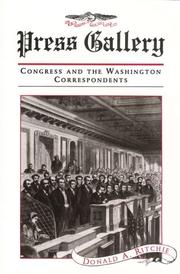
ISBN: 9780674703766 9780674703758 0674703758 9780674703759 0674703766 9780674042780 0674042786 Year: 1991 Publisher: Cambridge, Mass. Harvard University Press
Abstract | Keywords | Export | Availability | Bookmark
 Loading...
Loading...Choose an application
- Reference Manager
- EndNote
- RefWorks (Direct export to RefWorks)
'Press Gallery' examines the lives of Greeley, Horace White, Ben"" Perley Poore, Emily Briggs, Jane Grey Swisshelm, James G. Blaine, and others who were positioned in the hub of government when the Civil War, the purchase of Alaska, the Credit Mobilier scandal, and the Johnson impeachment hearings were making front-page news.
Journalists --- Press and politics --- Politics and the press --- Press --- Advertising, Political --- Government and the press --- Journalism --- Columnists --- Commentators --- Authors --- History. --- Political aspects --- United States. --- Reporters and reporting --- Washington (D.C.) --- Politics and government. --- Politics --- Reporting --- By --- News media. --- History
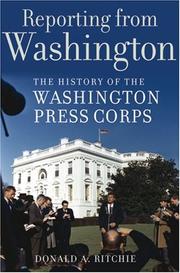
ISBN: 0195178610 0195308921 0195346327 1280965738 1429461861 0197715834 Year: 2005 Publisher: Oxford University Press, Incorporated
Abstract | Keywords | Export | Availability | Bookmark
 Loading...
Loading...Choose an application
- Reference Manager
- EndNote
- RefWorks (Direct export to RefWorks)
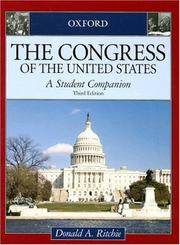
ISBN: 0195309243 0198042221 Year: 2006 Publisher: Oxford University Press, Incorporated
Abstract | Keywords | Export | Availability | Bookmark
 Loading...
Loading...Choose an application
- Reference Manager
- EndNote
- RefWorks (Direct export to RefWorks)
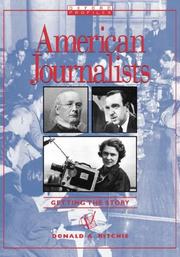
ISBN: 019532837X 0198025947 Year: 2007 Publisher: Oxford University Press, Incorporated
Abstract | Keywords | Export | Availability | Bookmark
 Loading...
Loading...Choose an application
- Reference Manager
- EndNote
- RefWorks (Direct export to RefWorks)
Book
ISBN: 0199940576 0199940576 Year: 2011 Publisher: New York ; Oxford : Oxford University Press,
Abstract | Keywords | Export | Availability | Bookmark
 Loading...
Loading...Choose an application
- Reference Manager
- EndNote
- RefWorks (Direct export to RefWorks)
'The Oxford Handbook of Oral History' brings together 40 authors on five continents to address the evolution of oral history, the impact of digital technology, the most recent methodological and archival issues and the application of oral history to both scholarly research and public presentations.
Oral history. --- Oral history --- Interviewing. --- Historiography. --- Methodology.
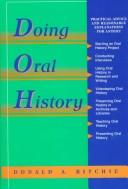
ISBN: 0805791280 Year: 1995 Publisher: New York (N.Y.): Twayne
Abstract | Keywords | Export | Availability | Bookmark
 Loading...
Loading...Choose an application
- Reference Manager
- EndNote
- RefWorks (Direct export to RefWorks)
| Listing 1 - 10 of 25 | << page >> |
Sort by
|

 Search
Search Feedback
Feedback About UniCat
About UniCat  Help
Help News
News